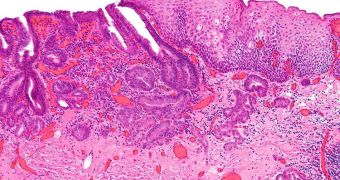Through the use of advanced research methods, a team of experts was recently able to shed new light on the intricate genetic workings of a type of cancer called clear cell renal cell carcinoma (ccRCC).
Analysis of biological samples collected from patients has determined that 41 percent of those suffering from this condition exhibit truncating mutations on a gene called PBRM1. About 92 people in a 227-large study group showed the abnormality.
The fact that this mutation may be influencing the onset and development of ccRCC has been demonstrated using a medical investigations technique called high-throughput DNA sequencing.
A paper by Varela et al., published earlier this year in the top journal Nature, shows that the troublesome gene is located on chromosome 3, and that it plays a role in mediating protein-protein interactions and DNA-binding through some of its domains.
But the team also shows that past investigations linked PBRM1 mutations in breast, lung, gall bladder, renal and pancreatic cell lines. Mouse models suffering from pancreatic cancer showed the same mutation at the same location on the same gene.
As far as renal cell carcinoma goes, PBRM1 was demonstrated to play a tumor-suppressing role. When experts inhibited its functions, they found that RCC lines proliferated faster.
The same study, conducted on mice, shows that the process of cancer cell colony formation increased in efficiency in the absence of PBRM1 expression. Cell migration, such as that of cancer cells through the bloodstream, was also detected at increasing levels.
This demonstrates that the gene plays a tumor-suppressing role in general. The team made an additional finding too, while analyzing the genes ARID1A and ARID5B. Both of them are components of the SWI/SNF chromatin-remodelling complex, of which PBRM1 is also a part.
What experts could not establish was the extent to which these two, newly-found genes contributed to favoring the development of ccRCC. But at least now oncologists have a new direction of research.
As scientists begin to understand the role of chromatin regulation in renal cell carcinoma, they are also getting closer to developing new therapies and diagnostics tools against kidney cancer, experts with BHD Research explain.

 14 DAY TRIAL //
14 DAY TRIAL //